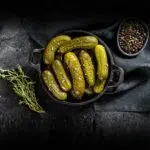National Kraut and Frankfurter Week is observed in the second full week of February and this year will be marked from February 8 to 14. ‘Sauerkraut’ and frankfurters have long been associated with filling and comforting German cuisine. Many people, however, are unaware of how closely these two foods have been linked throughout history. The word ‘kraut’ is a shortened version of ‘sauerkraut.’ Frankfurters are single-serving stuffed meat casings perfected in Frankfurt, Germany. In beer gardens, they’re frequently served in buns with kraut on top. People travel from all over the world to sample these delectable foods.
History of National Kraut and Frankfurter Week
Although many people believe sauerkraut is a German invention, it actually originated in Ancient China over 2,000 years ago, when it was made from shredded cabbage fermented in rice wine. It is thought to have been brought to Europe by Genghis Kahn a thousand years later.
The Germans and Dutch adopted this dish into their daily lives as a means of preventing scurvy. The frankfurter, a pork-based meat sausage, has been around since the Middle Ages and is named after the German city of Frankfurt. The word kraut is a shortened version of sauerkraut. The sour flavor of shredded cabbage comes from fermentation. Because American sauerkraut producers were afraid of being labeled with a German word during World War I, they called it “Liberty Cabbage.” These sausages were first served at the Römerberg during the Imperial coronation ceremonies. During the 1800s, Pennsylvania Dutch and German settlers introduced sauerkraut and frankfurters to the U.S.
During WWII, it is said that Sauerkraut was renamed Liberty Cabbage due to concerns raised by the product’s German name. Both frankfurters and sauerkraut have become staples of American cuisine, despite the fact that they have reverted to their original names. In Coney Island, New York, in the early 1900s, hot-dog stands appeared, selling sausages as sandwiches, contributing to the island’s associations with picnics, barbeques, and athletic events. National Kraut and Frankfurter Week honor the history of these two foods, as well as their delectable combinations, in order to demonstrate how the fusion of cultures can result in delectable dishes for all to enjoy.
National Kraut and Frankfurter Week timeline
Pennsylvania Sauerkraut and frankfurters are introduced to the U.S. by Dutch and German settlers.
The Freemont Kraut Company is founded by a group of small sauerkraut producers from the Great Lakes region.
The slang term "kraut" is used to refer to sailors and eventually all German soldiers during WWI and WWII.
Despite the fact that they are reverted to their original names, frankfurters and sauerkraut have become staples of American cuisine.
National Kraut and Frankfurter Week FAQs
Is it possible to distinguish between sauerkraut and kraut?
The terms are interchangeable and derived from the German word for cabbage or herb. Kraut has made a comeback in recent years.
What is it about sauerkraut that makes Germans so fond of it?
Eating sauerkraut is a way for Germans to ensure that the coming year will be blessed with plenty of blessings.
What is the distinction between a frankfurter and a hot dog?
Hot dogs are derived from the Frankfurter, originally a sausage in Germany.
National Kraut and Frankfurter Week Activities
Try some of the food
To commemorate the week, make your own frankfurters and sauerkraut from scratch. Use online recipes, or purchase your favorite brand at your local grocery store.
Share it on social media
Use the hashtags #NationalFrankfurterAndKrautWeek and #FrankfurterAndKrautWeek on social media. Let your friends and family know that this is a great time to eat delicious food and have a good time.
Head over to the authentic German cuisine
If you want a more authentic experience, visit an Amish community or a German festival in your area. You are bound to sample authentic German cuisine.
5 Fun Facts About Kraut
First mentioned in dictionary
In 1776, the American English Dictionary included the word ‘sauerkraut’ for the first time.
High digestive
Digestion enzymes found in sauerkraut aid in the breakdown of starches, proteins, and fats.
Natural antioxidant
Vitamin C is abundant in sauerkraut, which aids in collagen production and serves as a natural antioxidant for immune system support.
Prevent scurvy during sea voyages
During long sea voyages in the 18th Century, explorers like Captain Cook used sauerkraut to prevent scurvy, bringing up to 25,000 pounds of the Vitamin-C-rich ferment with them.
Brought sauerkraut to the U.S.
German and Central European immigrants brought sauerkraut to the U.S. during the Great Migration, primarily to Pennsylvania and Ohio, where they became known as the Pennsylvania Dutch.
Why We Love National Kraut and Frankfurter Week
Frankfurter are the best comfort food
A frankfurter, a soft drink, and a bag of fries Who among us wouldn't want all three within easy reach? It's the ultimate comfort food trio!
They are nice alternatives
There's no denying that frankfurter is America's favorite food. The numbers back it up with about 50 billion frankfurters consumed each year!
Sauerkraut is both delicious and nutritious
Because your gut houses 70% of your immune system, it's important to eat foods that promote gut health. One of the best ways to do this is to eat raw sauerkraut, which also contains vitamins K, C, and B, calcium, magnesium, dietary fiber, folate, iron, copper, manganese, and potassium.
National Kraut and Frankfurter Week dates
| Year | Date | Day |
|---|---|---|
| 2024 | February 11–17 | Sunday–Saturday |
| 2025 | February 9–15 | Sunday–Saturday |
| 2026 | February 8–14 | Sunday–Saturday |



























